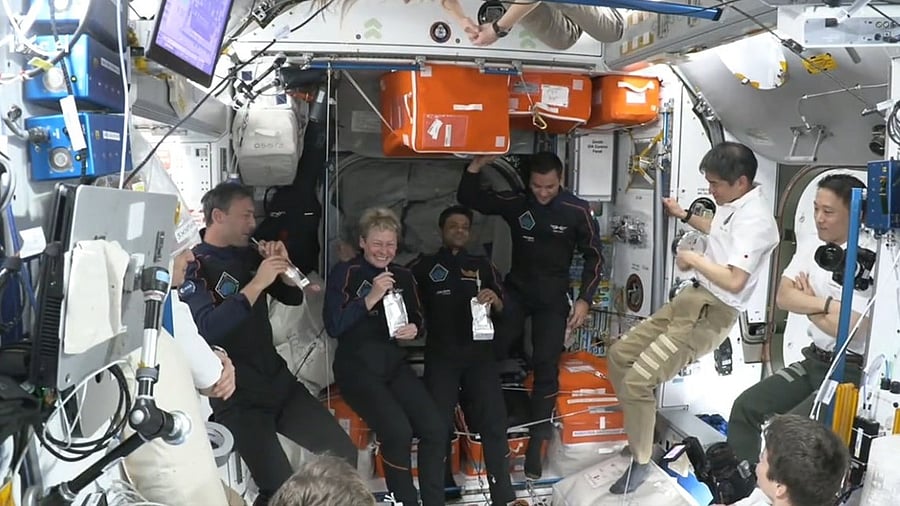
The Axiom-4 crew in the ISS.
Credit: X/@SpaceX
Chennai: Scripting history, Indian Air Force’s Group Captain Shubhanshu Shukla on Thursday became the first Indian to set his foot on the International Space Station (ISS) and the second to reach space after Rakesh Sharma’s odyssey in 1985.
The Dragon spacecraft with Shukla as the pilot and three other astronauts Peggy Whitson (US), Slawosz Uznanski-Wisniewski (Poland), and Tibor Kapu (Hungary) aboard docked outside the ISS at 4:01 PM IST, about 30 minutes ahead of schedule.
Over two hours later, the hatch of the Dragon spacecraft of SpaceX owned by billionaire Elon Musk opened with all four astronauts floating in space and crossing over to the ISS, which was passing over the north Atlantic Ocean.
“Grace is happy to be on Harmony,” Peggy Whitson, the flight’s commander and a NASA veteran who has accumulated 665 days in space, more than any other American astronaut in the world, said. The Axiom-4 mission by Axiom Space, SpaceX, and NASA took about 28 hours to reach the ISS from NASA’s Kennedy Space Center in Florida, US, where it blasted off at 12.01 PM IST on Wednesday.
“The hatch is open, the smiles are lightyears wide. Welcome aboard,” Axiom Space said, as the astronauts were welcomed with drinks and celebrations. Once they emerged from the Dragon spacecraft, the crew got their first look at their home in low Earth orbit.
Shukla is one of the four IAF pilots chosen for Gaganyaan, the country’s first human spaceflight, and underwent a 10-month training from NASA, Axiom Space, and SpaceX for his journey to space.
The experience Shukla will gain in the Ax-2 mission is likely to help Gaganyaan mission, scheduled for the first quarter of 2027. He is only the second Indian to reach space after Shukla landed in space as part of a Soviet mission in 1985. Shukla is also the 634th astronaut to travel to space.
Hours before their spacecraft docked at the ISS, Shukla and his fellow travellers spoke about their experiences travelling to space. “I am learning to live in microgravity conditions like learning to eat. It was an amazing experience to float in vacuum as our spacecraft circled the Earth on its journey,” Shukla said.
Shukla is carrying 100 gram packets of ready-to-drink mango nectar, and ready-to-eat carrot halwa, and moong dal halwa as food to be consumed in space. The entire crew, in their first contact after their lift-off on Wednesday, looked relaxed as they played with a small toy swan named Joy inside their spacecraft.
Swan was chosen for its cultural significance as it symbolises wisdom and is the vehicle of Saraswati, and it represents purity and resilience in Poland, and loyalty and grace in Hungary.
Shukla once again greeted his countrymen with a Namaskar and shared his “thrill” being on the way to space. “What a ride it was? It is an amazing feeling to be floating. This is not a personal accomplishment but a collective achievement of each one of you who have stood with me,” Shukla added.
The Axiom-4 crew will be in space for a 14-day mission on the orbiting laboratory conducting microgravity research, technology demonstrations, and outreach engagements. They will return to Earth and splashdown off the coast of California.
The Ax-4 research complement includes around 60 scientific studies and activities representing 31 countries, including the US, India, Poland, Hungary, Saudi Arabia, Brazil, Nigeria, UAE, and nations across Europe. The Indian astronaut will conduct seven microgravity research experiments during his stay at the ISS.
Shukla, who was commissioned into the Indian Air Force (IAF) fighter wing in June 2006, became Group Captain in March 2024 with 2,000 hours of flight experience across aircraft including Su-30 MKI, MiG-21, MiG-29, and Jaguar.
Originally scheduled for launch on June 8, the mission was postponed to June 10 and then to June 11 indefinitely after a joint review by ISRO, Axiom, and SpaceX teams decided to rectify the issue and revalidate before liftoff.
A liquid oxygen system leakage was detected in the propulsion bay during the test following which the mission was postponed. The leakage was detected during a 7-second hot test carried out at the launch pad to validate the performance of the booster stage of the Falcon 9 launch vehicle. The final launch took about a fortnight because all stakeholders focused on the safety of the astronauts.